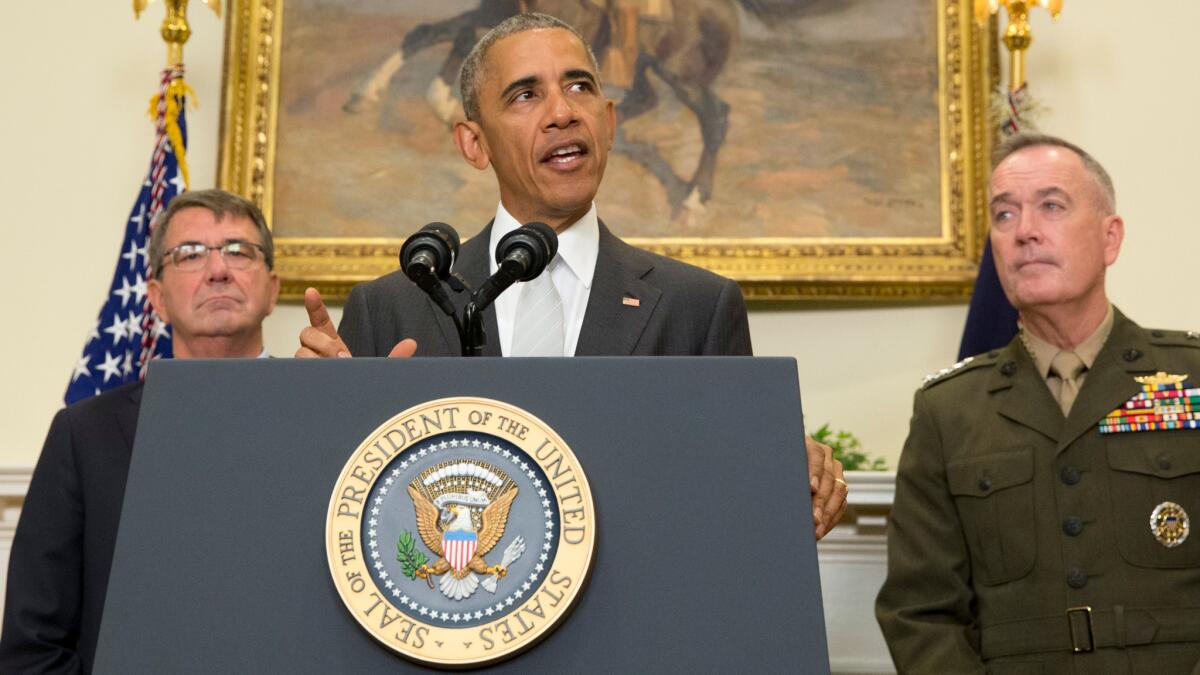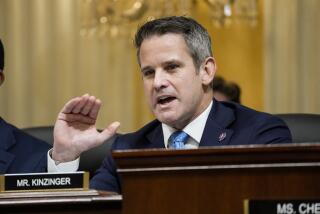Editorial: A necessary but frustrating delay in the U.S. withdrawal from Afghanistan

Almost 15 years after U.S. forces were sent to Afghanistan to dislodge a government that had shielded the architects of 9/11, Afghan forces remain unable to defeat the Taliban movement or put sufficient pressure on it to force a political settlement. Meanwhile, Islamic State and Al Qaeda have established a presence in that country, which has been hard hit in recent months by a string of suicide bombings and terrorist attacks.
Those facts justify President Obama’s decision this week to slow the scheduled departure of noncombat U.S. forces from Afghanistan. But they are also a depressing reminder that the president who had hoped to extricate the U.S. from foreign wars has not been able to achieve that goal.
In the latest of a series of setbacks, Obama said on Wednesday that he would heed the advice of his military advisors and cancel earlier plans to cut the current deployment of almost 10,000 troops to 5,500 by the end of this year. Instead, the U.S. will maintain 8,400 troops into next year, through the end of his administration. Obama said his decision meant “that my successor has a solid foundation for continued progress in Afghanistan as well as the flexibility to address the threat of terrorism as it evolves.” Obama pledged not to allow Afghanistan to reemerge as a haven for terrorists.
The remaining U.S. forces in Afghanistan serve as trainers and advisors for the Afghan army and engage in counter-terrorism operations. Nevertheless, as in Iraq, these activities place U.S. service members in harm’s way. Obama noted that over the last year and a half, 38 Americans – military and civilian – have lost their lives in Afghanistan. Although casualties are unlikely to approach in the future what they were at the height of the U.S. combat mission in Afghanistan – 499 U.S. troops were killed in 2010 – a continued presence means continued danger.
To some extent, the president’s decision to recalculate is due to the emergence of Islamic State and the resiliency of Al Qaeda. But a second-generation U.S. military presence in Afghanistan and Iraq also has been necessitated by the political and military failures of the governments of those nations.
The tide of war has receded, but not nearly as far as Obama predicted.
In Afghanistan, the army has assumed responsibility for frontline combat operations. On Wednesday, Obama noted that Afghan forces remain in control of all the major population centers and provincial capitals — a significant achievement in that decentralized country. Yet he added that the security situation remains “precarious” and that the Taliban has gained ground in some areas.
That situation, Obama said, necessitated a robust enough U.S. presence in Afghanistan to continue to assist Afghan forces and maintain bases at Jalalabad and Kandahar. Nor is the U.S. alone in providing assistance to Afghanistan. Other countries that were involved in the post-9/11 coalition against the Taliban have provided 6,000 troops to train and assist Afghan forces. Following Obama’s example, the NATO alliance is expected to extend its commitment to the Afghan military at the summit that begins Friday in Warsaw.
In 2011, when Obama announced that U.S. combat forces were leaving Iraq, he also said that “we’re beginning to bring our troops home from Afghanistan.” Overall, he assured the American people, “the tide of war is receding.”
Now, however, even the president – a reluctant warrior – has recognized that for the foreseeable future U.S. troops will continue to be involved in both countries for both military and political purposes, albeit in a role dramatically reduced from its peak several years ago. Meanwhile, as part of a campaign to “degrade and ultimately destroy” Islamic State, the U.S. has been engaged in an air campaign in Iraq and Syria and has aggressively assassinated terrorist figures in the Middle East and Africa.
The tide of war has receded, but not nearly as far as Obama predicted. That is a bitter pill not only for him but also for the rest of the country.
Follow the Opinion section on Twitter @latimesopinion and Facebook
More to Read
A cure for the common opinion
Get thought-provoking perspectives with our weekly newsletter.
You may occasionally receive promotional content from the Los Angeles Times.





